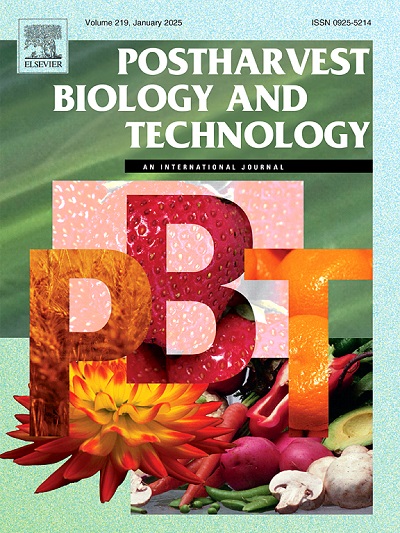Disorder of cell wall metabolism during the transition of citrus juice sacs from healthy to pre-granulation and granulation stages: Evidence from Shiranui mandarin
IF 6.4
1区 农林科学
Q1 AGRONOMY
引用次数: 0
Abstract
Citrus granulation is the major physiological disorder that adversely affects fruit quality during postharvest senescence. The "Disorder of cell wall metabolism" hypothesis has proposed that cell wall metabolism disorder may drive nutrient depletion and juice sacs granulation, primarily based on comparisons between non-granulated and granulated juice sacs. However, the metabolic changes during the transition from healthy to pre-granulation and granulation stages remain unexplored. Hence, this study comprehensively analyzed metabolites, enzyme activities, and gene expressions of juice sacs from Shiranui mandarin at these stages. Cell wall components, including cellulose and chelate-soluble pectin, progressively increased from healthy to pre-granulation and granulation stages, while lignin content remained stable. Concurrently, sugars and citrate decreased significantly in the granulation stage, with glucose and citrate beginning in the pre-granulation stage. Transcriptional activation and increased precursors for lignin synthesis were observed in the pre-granulation stage and intensified in the granulation stage. Key genes for cellulose synthesis were also activated, pectin demethylesterification was initiated, and pectin degradation was repressed starting from the pre-granulation stage, and intensified in the granulation stage. Transcriptional repression of sucrose synthesis and activation of sucrose degradation began in the pre-granulation stage and intensified in the granulation stage. Citrate degradation was driven by suppressed synthesis, and enhanced degradation via the acetyl-CoA and glutamine pathways, initiating in the pre-granulation stage and intensifying in the granulation stage. No energy deficiency was observed in juice sacs in either stage. Overall, this study is the first to provide direct evidence that cell wall metabolism disorder initiates before granulation and becomes more pronounced during granulation, supporting its role in driving citrus granulation and expanding the “Disorder of cell wall metabolism” hypothesis. These findings offer novel insights into the mechanism underlying citrus fruit senescence.
求助全文
约1分钟内获得全文
求助全文
来源期刊

Postharvest Biology and Technology
农林科学-农艺学
CiteScore
12.00
自引率
11.40%
发文量
309
审稿时长
38 days
期刊介绍:
The journal is devoted exclusively to the publication of original papers, review articles and frontiers articles on biological and technological postharvest research. This includes the areas of postharvest storage, treatments and underpinning mechanisms, quality evaluation, packaging, handling and distribution of fresh horticultural crops including fruit, vegetables, flowers and nuts, but excluding grains, seeds and forages.
Papers reporting novel insights from fundamental and interdisciplinary research will be particularly encouraged. These disciplines include systems biology, bioinformatics, entomology, plant physiology, plant pathology, (bio)chemistry, engineering, modelling, and technologies for nondestructive testing.
Manuscripts on fresh food crops that will be further processed after postharvest storage, or on food processes beyond refrigeration, packaging and minimal processing will not be considered.
 求助内容:
求助内容: 应助结果提醒方式:
应助结果提醒方式:


